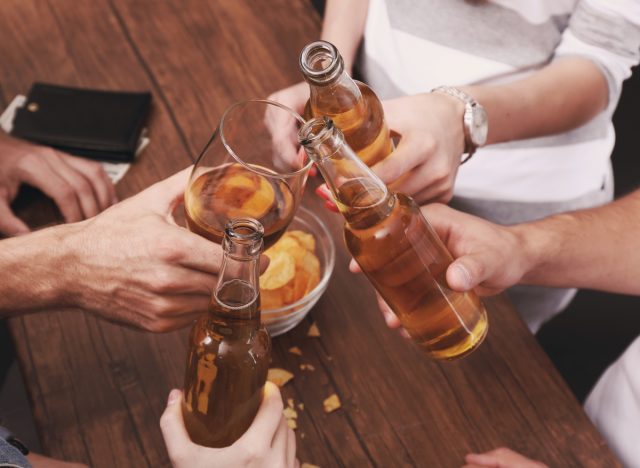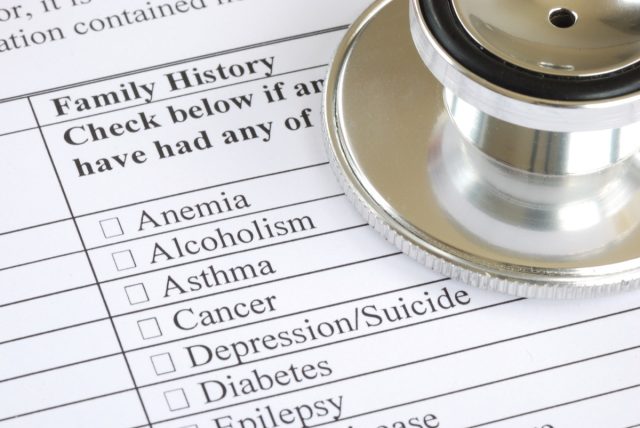
Alcoholism is a widespread problem that can affect anyone. The National Institute on Alcohol Abuse and Alcoholism states that a 2019 study showed "14.5 million (nearly 15 million) people ages 12 and older (5.3 percent of this age group) had Alcohol Use Disorder. This number includes 9.0 million men (6.8 percent of men in this age group) and 5.5 million women (3.9 percent of women in this age group)." So when do a few drinks turn into something more? The National Institute on Alcohol Abuse and Alcoholism defines heavy drinking as "consuming more than 3 drinks on any day or more than 14 drinks per week" for men and consuming more than 3 drinks on any day or more than 7 drinks per week for women." Eat This, Not That! Health talked to experts who explained signs you may have an alcohol problem and how to help someone struggling with alcoholism. Read on—and to ensure your health and the health of others, don't miss these Sure Signs You've Already Had COVID.

Licensed therapist and addiction expert Michael Damioli with Clinical Director, Colorado Medication Assisted Recovery says, "One of the easiest ways to conceptualize problematic alcohol use is through the concept of pre-occupation, which is the concept that alcohol becomes a larger and larger part of a person's thought process. That someone thinks about alcohol throughout the day, it's one of the first thoughts they have in the morning and when going to bed. Even if they don't drink throughout the day, thinking about alcohol, making plans to drink, and making justifications or excuses to drink become a large part of a person's mind. When preoccupation becomes severe enough, it can become the main thought that someone has. They can live a perfect life, be at home having a lovely dinner with their amazing family and still, the main thought they have is something like 'I can't wait for this dinner to be over so I can start drinking.'"
RELATED: Sure Signs You Smoke Too Much Marijuana

Damioli explains, "The other concept is compulsion. That once someone starts to drink, they have difficulty stopping or moderating. Maybe someone goes out and plans to have 2 drinks with friends at a restaurant or bar, but once they start drinking, they lose the ability to make good decisions around their alcohol consumption, and drink too much. If this is a regular pattern for someone they may have or be developing an alcohol problem. Over time, the compulsion to drink can lead someone to develop a tolerance to alcohol which will require them to drink larger amounts over time to achieve the same level of intoxication from drinking."
RELATED: I'm a Doctor and Here's How to Avoid Omicron

"The DSM-5 is the diagnostic book for all psychiatric conditions which also outlines several criteria for alcohol use disorders," Damioli states. "There is one criteria that I always find to be a defining factor in determining if someone has a problem with alcohol which is, to paraphrase, that someone continues to drink alcohol despite having negative consequences. An example would be someone who experiences a DUI, a breakup, the loss of a job, etc due to their alcohol use, but continues to drink alcohol anyways. This is clearly starting to show that their alcohol use has become a problem."
RELATED: Omicron Symptoms Doctors are Seeing Most

According to Lisa Curtis, a licensed clinical social worker and credentialed alcohol and substance abuse counselor, "Greater quantities of alcohol are being consumed than intended, often happening slowly over time. This is often an internal warning sign that only the person is going to know about but this is what it sounds like to them, 'I'm going to have 3 beers with the guys and then head home because I have work tomorrow.' In reality, those 3 beers turn into a long evening out, much more alcohol consumed and heading into work with a hangover. What this also looks like is a lack of capacity to accurately gauge where and when the drinking will stop."
RELATED: I'm a Doctor and Warn You Know This Before Taking Ibuprofen

"Alcohol centered events begin to take the center-stage for socializing rather than being a part of the time with friends or family it becomes the reason," Curtis states. "Going to an occasional wine tasting or beer-fest is not out of the norm but when most events become alcohol themed a line has started to be crossed. This also applies to ensuring that there is alcohol at an event or gathering by either bringing it yourself or finding out in advance if it will be there."
RELATED: The #1 Cause of Heart Attack, According to Science

Curtis explains, "Using alcohol to 'take the edge off' a feeling or amplify a feeling, such as having a drink before heading out for a first date or feeling that there is no way to celebrate a birthday without getting drunk/highly intoxicated. Using alcohol to change the way one feels is a red flag to be mindful of; like most things, a little bit is unlikely to cause you a problem but using too much or too frequently is unwise and problematic."
RELATED: The Worst Side Effects of 5 Popular Supplements

"One is at greater risk for an alcohol or substance related issue if they: have a history of trauma, a genetic background of addiction, began using in their 'tween' years or very early adolescence, grew up in a home where using was problematic," Curtis says. "The time to seek support and treatment is when you start to wonder if you're drinking is a problem or if it's starting to cause problems in your life. Some of the earliest signs of a problem are highly personal and internal, often sounding like a question that starts with, 'I know I should but…'"
Damioli adds, "It's nearly impossible to predict who will develop a problem with alcohol but there are many potential predictive features. Having a family history of alcoholism certainly puts someone at a much higher risk for developing an alcohol problem. The genetic and biological component of alcoholism is significant and shouldn't be underestimated. Some other risk factors include the age that someone starts to drink, the amount of alcohol needed to get them drunk (more alcohol needed = higher chance of addiction) as well as the existence of other mental health issues or traumatic experiences."
RELATED: Forgetting This One Thing Can Mean You Have Alzheimer's

Curtis states, "If someone you love and care about is struggling and you're seeking to help them, one of the best things to do is to allow them to feel the natural consequences of their drinking or using; not cleaning up their messes or making excuses for them. Another important step is to remember that loving someone doesn't mean you can't tell them their actions are hurtful to you. If the person you love is an adolescent showing them how much you care also means being ready for them to be initially angry with you for asking them to take care of themselves, with your help. If you, or someone you love, needs support please keep in mind that there is help out there but it often takes a lot of starts and stops to find what fits best; like any treatment, there is no one size fits all." And to get through this pandemic at your healthiest, don't miss these 35 Places You're Most Likely to Catch COVID.
Heather Newgen
Heather Newgen has two decades of experience reporting and writing about health, fitness, entertainment and travel. Heather currently freelances for several publications. Read more
